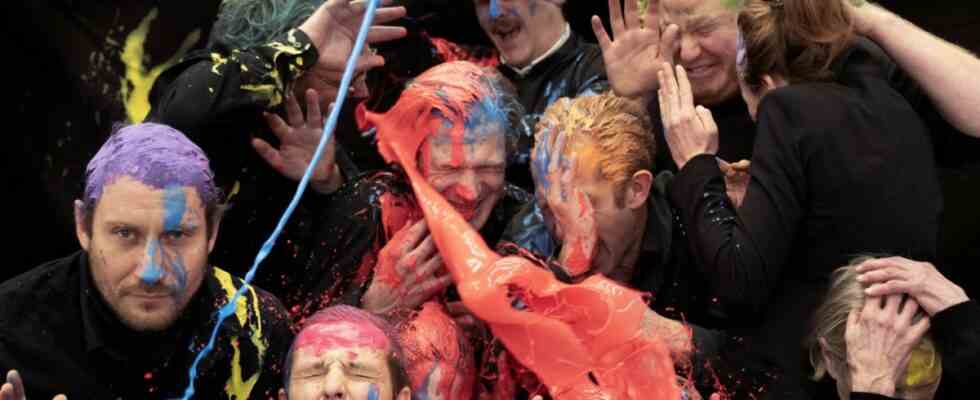Albert Camus’ play “The Possessed” is the compression of the 900 pages of Dostoyevsky’s novel “The Demons” to 110. And Jette Steckel’s staging of this drama version compresses the material even further. That is why the most important question about this premiere, with which the Lessing Days opened at Hamburg’s Thalia Theater, is: What remains of the complex web of relationships and the ideological struggles of the material, this thunderstorm of theses about nihilism, socialism, anarchism and egoism?
First a religious nightmare. With Nadin Schumacher, Jette Steckel built a closed school out of panels for ten quarreling figures from Dostoyevsky’s cosmos of figures. However, this cell made up of classrooms is not labeled with school material, but with the monsters of Hieronymus Bosch. The chalk in the hands of Tim Burchardt, who hovers live in a hanging basket painting above the action, draws the hellish figures from Bosch’s “Garden of Earthly Delights” on the wall.
If this interpretation aid suggests anything, it is that the history of ideas of the isms is an inferno that blazes in the exotic distance. In the light of the present, Dostoyevsky’s enthusiasts and self-proclaimed revolutionaries of 1873 seem more like absurd hybrids of ideological blindness, half-digested chunks of knowledge and an overpowering drive for self-portrayal. In Steckel’s version, these ardent revolutionaries from the time of Tsarism, whom Dostoyevsky allowed everyone to fail because of their vanities, longings and feelings of guilt, find very little connection to a time when radical conspiracies fermented under red MAGA caps in the style of Donald Trump.
The production doesn’t offer current food for thought, but it does offer an inspiring game
It is the core problem of this colorful production, which begins with everyone smearing color into their hair, that it does not save the historical debates about God, Russia, justice and freedom from their artificiality. The version that Steckel created with the dramaturge Emilia Heinrich in the hope of being able to draw parallels with today’s totalitarianism (e.g. in Russia) focuses too much on the male disputes about abstract truths to provide topical food for thought. On the other hand, this version of the material dispenses with essential bridges in the plot, as provided by the narrator in Camus’ version, which has been deleted here. As a result, the acts of desperation that ultimately lead to the violent death of most of those present are rarely derived in a meaningful way. Lost in the material like the sinners in Bosch’s world of hell, the only thing that saves the audience is that the story’s incoherent narrative is played with enthusiasm.
Glowing revolutionaries from the time of tsarism: Scene from “The Possessed” by Albert Camus (after Dostoyevsky).
(Photo: Armin Smailovic)
Jirka Zett as the charismatic central character Nikolai Stavrogin, whose enigmatic indifference to all events is based on a terrible secret, winds his way through the debates and demands of his fellow human beings with a fragile sovereignty that is great theatrical art. His former followers, who want to win him over to their cause again, find temperamental counterparts in the furious urgency of Felix Knopp as Schatov, in the mean seductiveness of Sebastian Zimmler as Verkhovensky and the deluded messianism of Kirillov, played by Nils Kahnwald.
In one of his best roles, Julian Greis gives the play’s stupid, drunkard and parasitic characters the touching desperation of a person in crisis. And so every color shade of bourgeois tragedy, which negotiates the failure of longing between boredom, the search for happiness and false self-image, finds its philosophy of life in this ensemble, which also includes Barbara Nuts, Lisa Hagmeister, Maike Knirsch, Cathérine Seifert and André Szymanski. If only you knew what this garden of theatrical arts actually wants to say about our current time of crisis.
The further announcements of the Lessing Days, which offer a dense festival program until February 12th, are much more specific: Iranian director Amir Reza Koohestani stages Aldous Huxley’s human factory from the novel “Brave New World” as a mirror image of the mullahs’ state. In two guest performances, the Ukrainian group Dakh Daughters deals with the relationship between art and war. Yael Ronen presents her musical “Slippery Slope” about the pitfalls of identity politics, Romeo Castellucci shows his psycho-experiment “Bros” about strict obedience, and Nicolas Stemann’s Zurich production of “Oedipus Tyrann” elaborately spins the thread of criticism of power. Here are the demons of our time.

